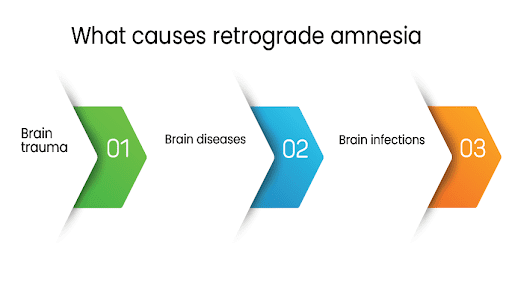Introduction
Amnesia is a memory loss condition. Retrograde amnesia is a type of amnesia where the patient cannot recall the memories before the event, which caused the onset of the amnesia. In this article, we will be reading about the details of retrograde amnesia, its causes, and how you deal with retrograde amnesia.
Our Wellness Programs
What is Retrograde Amnesia
Retrograde amnesia is a type of amnesia where the patient cannot recall the memories before the event which caused the amnesia in the first place. Here, the patient cannot remember events that occurred just before the event, which caused amnesia, and cannot remember events from years or decades ago. There are two categories of amnesia – neurological amnesia and functional amnesia. Neurological amnesia is the more common one, and its causes are brain injuries, brain diseases like Alzheimer’s, stroke, tumours, and brain infections like encephalitis, Lyme disease, etc. Emotional trauma causes a rare type of functional amnesia.
Retrograde amnesia occurs due to trauma on the memory storing part of the brain or by brain disease or infection. With retrograde amnesia, memory loss is in the form of facts and not skills.
Looking for services related to this subject? Get in touch with these experts today!!
Experts

Deepti Gandhi

India
Life Coach
Experience: 6 years

Ritu Singh

India
Life Coach
Experience: 16 years

Banani Das Dhar

India
Wellness Expert
Experience: 7 years

Devika Gupta

India
Wellness Expert
Experience: 4 years

Trupti Rakesh valotia

India
Wellness Expert
Experience: 3 years
How do you know if you have retrograde amnesia?
There are different phases of retrograde amnesia. The first phase of it is when the most recently acquired memories are first lost, and the old memories are safe. It is called Ribot’s law. From here, the patient starts to lose the old memories and the new memories are safe.
The extent of it is different for different patients. Some patients lose memories for only a few years before the condition, which causes the onset of amnesia. In contrast, some patients lose memories decades before the onset of the disease, which causes amnesia.
The main symptoms of this type of amnesia are:
- Memory loss[2][4] before the condition caused the onset of amnesia.
- Forgetting tangible things like names, addresses, and general knowledge before the onset of amnesia.
- Being able to remember year-long memories like childhood memories, etc.
- Remember skills acquired before the condition caused amnesia, like driving, cooking, etc.

What causes retrograde amnesia
Many conditions cause retrograde amnesia[1]. It is of two types based on the causes- Neurological retrograde amnesia and Functional Retrograde amnesia. We will read about both the categories of retrograde amnesia.
Neurological Retrograde Amnesia: This type of amnesia is due to brain trauma on the memory-storing part of the brain, a brain disease, a brain infection, or other causes.
- Brain trauma: A brain trauma[3] may cause injury to the memory storing part of the brain and lead to this type of amnesia. Severe trauma may lead to severe injuries to the brain and cause amnesia.
- Brain diseases: There are several brain diseases like Alzheimer’s, stroke, seizures, or a brain tumour that may cause this type of amnesia.
- Brain infections: Brain infections like encephalitis, Lyme disease, and even H.I.V. may lead to this type of amnesia.
- Other Causes: There are several other factors like Thiamine deficiency caused by alcoholism; cardiac arrest; Anoxia which is a shortage of oxygen to the brain that may also cause this type of amnesia.
Functional Retrograde amnesia is caused mainly by an emotional trauma to the brain.
How do you diagnose retrograde amnesia?
Suppose you are suffering from any kind of symptoms as mentioned above or suffered from any condition which may have caused the onset of retrograde amnesias like brain trauma, disease, or infection. In that case, you must visit your doctor for further treatment.
Your doctor will run a series of tests to confirm whether you have this type of amnesia or not. The doctor may also inquire about your past medical conditions like alexander’s, heart diseases, history of strokes and seizures, past infections, etc., which may have caused retrograde amnesia. The following tests will help the doctor confirm this type of amnesia:
- Brain imaging scans like M.R.I. and C.T. scans look for damage in the memory storing part of the brain.
- Blood tests to look for infections.
- A neurological test.
- Cognitive tests to look for short-term and long-term memory loss.
- An electroencephalogram to look for seizure activity.
After completing the above tests, the doctor will evaluate the results and confirm whether you have this type of amnesia or not.
How is retrograde amnesia treated?
There are no specific medications or courses of treatment to cure retrograde amnesia. However, there are ways to treat the underlying cause of the condition. There are some of the most common remedies:
- Occupational Therapy: This treatment or therapy helps improve past lost memories by recreating or replacing them. Therapists can take help of your old memories, which are still intact in your brain and use your family or friends to replace the relatively latest lost memory with new memories.
- Psychotherapy: This is another treatment used to replace lost memories because of emotional trauma.
- Meditations: Medications effectively cure the underlying causes of retrograde amnesia like brain infections, cardiac ailments, anoxia, thiamine deficiency, etc. Medications cannot treat conditions like Alzheimer’s.
Conclusion
Retrograde amnesia is a type of amnesia where the patient loses the memories before the event, which causes the onset of it. Some people may lose memories for up to a few years, while others may lose long-term memories. Many factors cause this amnesia. When conditions such as brain trauma, brain diseases, brain infection, and other underlying conditions cause retrograde amnesia, it is called Neurological Retrograde Amnesia. Amnesia caused by emotional trauma is called Neurological Retrograde Amnesia.
Several reasons like a brain injury cause neurological amnesia; brain diseases like Alzheimer’s, strokes, and seizures; brain infections like encephalitis, H.I.V., and Lyme disease; and other factors like cardiac ailments, thiamine deficiency, etc. Diagnoses of retrograde amnesia include imaging scans of the brain, neurological tests, blood tests, cognitive tests, and E.C.G. tests. The course of treatment to cure this amnesia is by treating the underlying cause of the condition, therapy, and medications. If you need professional help, we are there at United we care for your help.
| [1] | Researchgate.net. [Online]. Available: https://www.researchgate.net/profile/Barbara-Knowlton/publication/12070620_Retrograde_Amnesia/links/5ce1a4bc458515712eb6976f/Retrograde-Amnesia.pdf. [Accessed: 10-Aug-2022]. |
| [2] | L. R. Squire and P. Alvarez, “Retrograde amnesia and memory consolidation: a neurobiological perspective,” Curr. Opin. Neurobiol., vol. 5, no. 2, pp. 169–177, 1995. |
| [3] | E. F. Loftus and T. E. Burns, “Mental shock can produce retrograde amnesia,” Mem. Cognit., vol. 10, no. 4, pp. 318–323, 1982. |
| [4] | Mgkvp.ac.in. [Online]. Available: https://mgkvp.ac.in/Uploads/Lectures/30/167.pdf. [Accessed: 10-Aug-2022]. |










